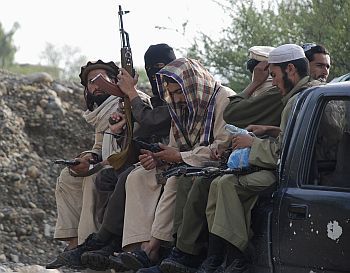 | « Back to article | Print this article |
 Confusion persists about the fate of two top militant commanders vying to replace Baitullah Mehsud as chief of the Pakistani Taliban, with conflicting reports emerging about their death in a fierce clash between them in the lawless tribal belt.
Confusion persists about the fate of two top militant commanders vying to replace Baitullah Mehsud as chief of the Pakistani Taliban, with conflicting reports emerging about their death in a fierce clash between them in the lawless tribal belt.
The fighting broke out between Hakimullah Mehsud and Wali-ur-Rehman during a meeting of the Tehrik-e-Taliban Pakistan 'shura' or council to choose Baitullah's successor following the outfit chief's reported death in a US drone attack, Interior Minister Rehman Malik said on Saturday night.
He said one of them was killed, but added that he was not in a position to confirm which of the two militant commanders had died in the clash.
State-run Pakistan Television reported that both Hakimullah and Rehman might have been killed in the clash. Private TV news channels reported that Hakimullah was killed while Rehman was seriously injured in the clash.
However, Taliban commanders in the tribal belt on Sunday refused to confirm or deny that a clash had occurred at the shura. They also said both Hakimullah and Rehman were safe.
They also said the shura met to devise a strategy against US drone attacks in the tribal belt.
The shura was held in South Waziristan, long considered the stronghold of Baitullah, who was believed to command up to 20,000 militants.
Adding to the confusion were remarks made by Interior Minister Malik, who told the media that the clash between Hakimullah and Rehman occurred on Friday. However, Hakimullah spoke to several media organisations, including BBC, on Saturday to deny that Baitullah had been killed.
Pro-government militant commander Turkistan Bhitani, a rival of Baitullah, also told the media this morning that Hakimullah and Rehman had been killed in a clash. He claimed there was fierce in-fighting between Taliban factions in the wake of Baitullah's death.
However, security analysts said Bhitani's comments could not be taken at face value due to his links to the government and opposition to Baitullah's network.
Meanwhile, more details emerged today about the reported death of Baitullah in a drone attack on his father-in-law's home in South Waziristan.
The missile strike occurred as Baitullah, a diabetic, was on a drip infusion for his kidney ailment, 'The New York Times' quoted two Taliban fighters as saying.
Baitullah was being tended to by one of his wives. They were both at the home of his father-in-law, Malik Ikramuddin, in Zanghara village in South Waziristan. Ikramuddin's brother, a medical practitioner, was treating Baitullah.
"He was clearly visible with his wife. His torso remained, while half of the body was blown up," said a senior security official who had seen video of the attack shot from the drone.
A Pakistani counter-terrorism official told the Times that 12 people were confirmed to have been killed in the strike, including Baitullah, his wife, an unidentified commander and seven bodyguards.
The drone attack on Baitullah was the result of "steady intelligence-sharing between the countries' intelligence services," American and Pakistani officials said.
The cooperation improved around the time of a secret visit to Washington in April by Lt Gen Ahmed Shuja Pasha, the chief of the Inter-Services Intelligence, to meet his CIA counterpart Leon Panetta.
At that meeting, the two sides agreed to focus on striking Baitullah's network, officials said.
Baitullah's network appeared to have weak links as intelligence about his whereabouts had come partly from informants inside the network who had been bought off by Pakistani spies, the Times reported.
The accuracy of US drone attacks against Baitullah's network has improved due to information gleaned by Pakistani intelligence operatives from informants inside the network, communications intercepts and satellite imagery shared by the US and Pakistani intelligence services.
Reportage: Rezaul H Laskar in Islamabad for PTI
Photograph: Reuters